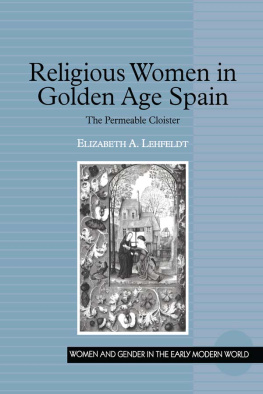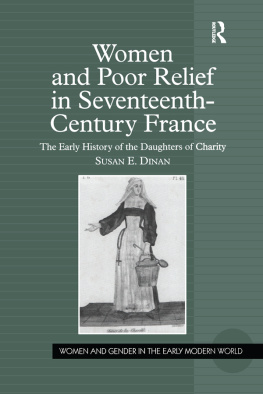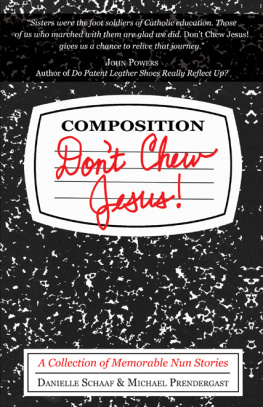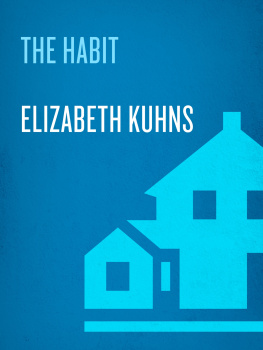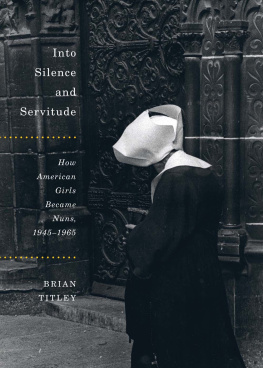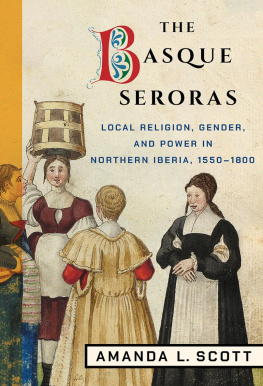RELIGIOUS WOMEN IN GOLDEN AGE SPAIN
Women and Gender in the Early Modern World
Series Editors: Ally son Poska and Abby Zanger
In the past decade, the study of women and gender has offered some of the most vital and innovative challenges to scholarship on the early modern period. Ashgates new series of interdisciplinary and comparative studies, Women and Gender in the Early Modern World, takes up this challenge, reaching beyond geographical limitations to explore the experiences of early modern women and the nature of gender in Europe, the Americas, Asia, and Africa. Submissions of single-author studies and edited collections will be considered.
Titles in the series include:
Women, Texts and Authority in the Early Modern Spanish World
Edited by Marta V. Vicente and Luis R. Corteguera
Women Writers in the Spanish Enlightenment
The Pursuit of Happiness
Elizabeth Franklin Lewis
Queenship and Political Power in Medieval and Early Modern Spain
Edited by Theresa Earenfight
Shamanism, Catholicism and Gender Relations in Colonial Philippines, 15211685
Carolyn Brewer
Women in the Seventeenth-Century Quaker Community A Literary Study of Political Identities, 16501700
Catie Gill
Architecture and the Politics of Gender in Early Modern Europe
Edited by Helen Hills
The Marital Economy in Scandinavia and Britain 14001900
Edited by Maria gren and Amy Louise Erickson
First published 2005 by Ashgate Publishing
Published 2017 by Routledge
2 Park Square, Milton Park, Abingdon, Oxon OX14 4RN
711 Third Avenue, New York, NY 10017, USA
Routledge is an imprint of the Taylor & Francis Group, an informa business
Copyright Elizabeth A. Lehfeldt 2005
The author has asserted her moral right under the Copyright, Designs and Patents Act, 1988, to be identified as the author of this work.
All rights reserved. No part of this book may be reprinted or reproduced or utilised in any form or by any electronic, mechanical, or other means, now known or hereafter invented, including photocopying and recording, or in any information storage or retrieval system, without permission in writing from the publishers.
Notice:
Product or corporate names may be trademarks or registered trademarks, and are used only for identification and explanation without intent to infringe.
British Library Cataloguing in Publication Data
Lehfeldt, Elizabeth A.
Religious women in golden age Spain : the permeable cloister. (Women and gender in the early modern world) 1. Catholic Church Spain Valladolid History 2. Convents Spain Valladolid History 3. Monasticism and religious orders for women Spain Valladolid History 4. Spain Church history
I. Title
271.90046230903
Library of Congress Cataloging-in-Publication Data
Lehfeldt, Elizabeth A., 1966
Religious women in golden age Spain : the permeable cloister / Elizabeth A. Lehfeldt.
p. cm. (Women and gender in the early modern world)
Includes bibliographical references and index.
ISBN 0-7546-5023-5 (alk. paper)
1. Convents Spain Valladolid History. 2. Monastic and religious life of women Spain Valladolid History. 3. Catholic Church Spain Valladolid History Modern period, 1500 4. Valladolid (Spain) Church history.
I. Title. II. Series.
BX4220.S7L44 2005
271.900462309031dc22 2004013247
ISBN 13: 978-0-7546-5023-2 (hbk)
This project has a long genesis and has incurred many debts along the way. My first thanks go to three extraordinary mentors. As an undergraduate history major at Lawrence University I benefited from the advice and encouragement of Anne Jacobson Schutte. She was the first to suggest graduate school as a possibility and then helped me prepare for the experience by supervising my honors project on Teresa of Avila and her confessors. I am grateful for her continuing support of my academic career. At Indiana University the inspired and lively scholarly example set by Dyan Elliott in her publications and classes challenged and encouraged me. To Helen Nader, my dissertation director, go a world of thanks. Hers is an example I can only hope to approximate. She is an exemplary scholar, a compassionate advisor, and a truly remarkable woman.
I was also fortunate enough to make lasting friendships at Indiana University. Kathy Hutnik, Michele Thomas, Virginia Picchietti, Gerry Sherayko, Debbie Gershenowitz, and Paul Murphy all had a hand in this project by making my time in graduate school more personally rewarding.
I have been greatly aided in my work throughout this project by grants and fellowships. They include a Grant-in-Aid of research from the University Graduate School at Indiana University; a J. Stewart and Dagmar K. Riley Graduate Fellowship from the College of Arts and Sciences at Indiana University; an Andressohn Fellowship for the study of early modern European history and two Grants-in-Aid of Research from the Department of History at Indiana University; a Womens Studies Grant from the Womens Studies Program at Indiana University; a Bernadotte E. Schmitt grant from the American Historical Association; a National Endowment for the Humanities Summer Stipend; two subvention grants for research from the Program for Cultural Cooperation Between Spains Ministry of Education, Culture, and Sports and United States Universities; and faculty development funds from Cleveland State University.
In Spain I benefited from the generosity and openness of various archives and libraries. I am grateful to the staffs of the Biblioteca Nacional, Archivo Histrico Nacional, Archivo General de Simancas, Archivo Provincial de Valladolid, Archivo Municipal de Valladolid, Biblioteca de Santa Cruz, and Biblioteca de El Escorial. Besides access to the tremendous historical legacy of Spanish religious women, Spain also brought new friends into my life. Ellen Sackelman, Charlene Villaseor Black, Jess Escobar, John Sweet, and Paul Allen made my year of dissertation research a joyous adventure.
My research in Spain was made infinitely easier by the support and assistance of several scholars. I especially thank Heath Dillard for the insights and advice she offered me before I set out for Spain. While in Spain, Adeline Rucquoi graciously spent an afternoon with me, sharing her wealth of knowledge about Valladolid.
Before it was a book, this project was a dissertation. My dissertation group at Indiana University supported and challenged me during the writing-up process. Tom Cragin and Willard Sunderland deserve special thanks for providing exacting and constructive criticism liberally sprinkled with good humor and engaging conversation. Thanks, too, to the other members of my dissertation committee, Muriel Nazzari and Arthur Field.
My family has supported me unswervingly. Offering financial assistance, encouraging me to stay the course, and cheering me on, I have never doubted their love and enthusiasm for my endeavors.
At Cleveland State I have enjoyed collegial and institutional support. Don Ramos, my department chair for seven years, never failed to communicate enthusiasm for the project and ushered me painlessly through my first years at the university. My colleagues in the Spanish program at CSU, Jos Labrador and Angel Zorita, have supported my work and provided the occasional cure when I was homesick for Spain. For searching obscure titles and delivering what must have seemed like a constant stream of books, I also owe tremendous thanks to the OhioLink and Interlibrary Loan office at CSU and its dedicated staff.

